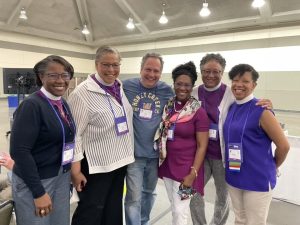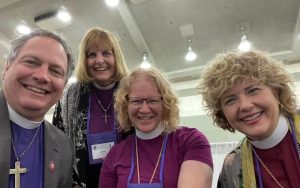A change of perspective in the House of Bishops
A report from Bishop Logue on the 80th General Convention held in Baltimore, MD July 8-11, 2022.
 This General Convention was the seventh I have traveled to on behalf of the Diocese of Georgia, but my first in the House of Bishops. The General Convention is sometimes compared to the US legislature with a larger House of Representatives and small Senate. In the General Convention, the House of Deputies comprises four lay persons and four clergy persons from each diocese for more than 800 deputies in a typical convention. Every convention has a lot of first time deputies learning their way around. The House of Bishops, which is more analogous to the Senate, has less than 150 members and most have previously taken part in a convention.
This General Convention was the seventh I have traveled to on behalf of the Diocese of Georgia, but my first in the House of Bishops. The General Convention is sometimes compared to the US legislature with a larger House of Representatives and small Senate. In the General Convention, the House of Deputies comprises four lay persons and four clergy persons from each diocese for more than 800 deputies in a typical convention. Every convention has a lot of first time deputies learning their way around. The House of Bishops, which is more analogous to the Senate, has less than 150 members and most have previously taken part in a convention.
Beyond this, the bishops meet at round tables with 5-6 bishops at a table. These table groups meet for the three years leading to a General Convention so that the group knows each other well before considering any legislation together.
 This familiarity changes the nature of debate on resolutions in the House of Bishops as you are speaking to a smaller group of people who you know well, creating a higher level of trust and allowing deeper conversations.
This familiarity changes the nature of debate on resolutions in the House of Bishops as you are speaking to a smaller group of people who you know well, creating a higher level of trust and allowing deeper conversations.
When we took up a resolution setting the pattern for revision of the Book of Common Prayer, we could hear concerns raised in the room about the process not be clear enough as written. We moved to table discussions and then asked a few bishops who had been very involved with the committee that drafted the resolution to speak to us about the intent. We discussed how best to clarify the text. Then we tasked a smaller working group with drafting a revision overnight that would take our discussion into account. Bishops raised concerns and tasked a smaller working group to draft a revision overnight. We returned to the matter led by Bishop Andy Doyle of the Diocese of Texas who was on that working group. We spent two more hours discussing the important matter that ended with greater clarity.
The resolution we ultimately passed with slight revision from the deputies, would not change the status of the 1979 prayer book or of the various liturgies authorized by General Convention that are not in it. It would, however, set the canonical framework for future evaluation and reorganization of those liturgies. The goal was to rein in a situation in which more than a dozen liturgical texts have been “authorized” – for trial use, experimental use, or simply “made available” – by General Convention over the years without clear guidance. The change to the constitution and this convention requires a second reading in 2024. At that convention, additional canonical provisions will be added after due consideration providing even further clarity. The resolution leaves in place the requirement that any prayer book changes must be approved by two successive General Conventions, and specifies that any changes must be authorized for trial use first meaning a new prayer book is at least eight years away and more realistically would take 11 years. Both the 1979 and 1928 prayer books would remain authorized for use.
I found the lengthy process of discussion helpful and saw how the ongoing relationships among bishops make this possible in a way difficult to achieve in the larger House of Deputies meeting only once for four days. I am grateful to get to represent you with my colleagues.
+Frank
Bishop Frank Logue
Pictured at top: Bishop Logue with the five bishops in the book This Band of Sisterhood written by St. Peter’s Savannah parishioner Dr. Westina Matthews. They are Bishops Jennifer Baskerville Burrows (Indianapolis), Carlye Hughes (Newark), Shannon MacVean Brown (Vermont), Phoebe Roaf (West Tennessee), and Kymberly Lucas (Colorado). Pictured below: Bishop Logue with table mates Bishops Betsy Monnot (Iowa) and Ruth Woodliffe-Stanley (South Carolina) in the foreground and Bishop Susan Brown Snook (San Diego) standing to Frank’s right.
